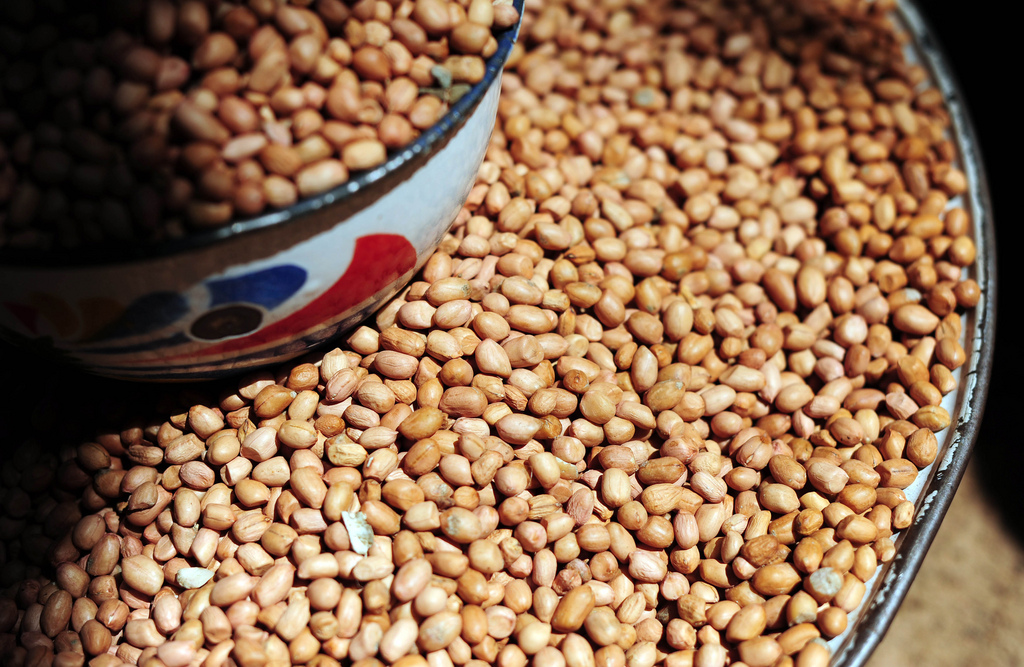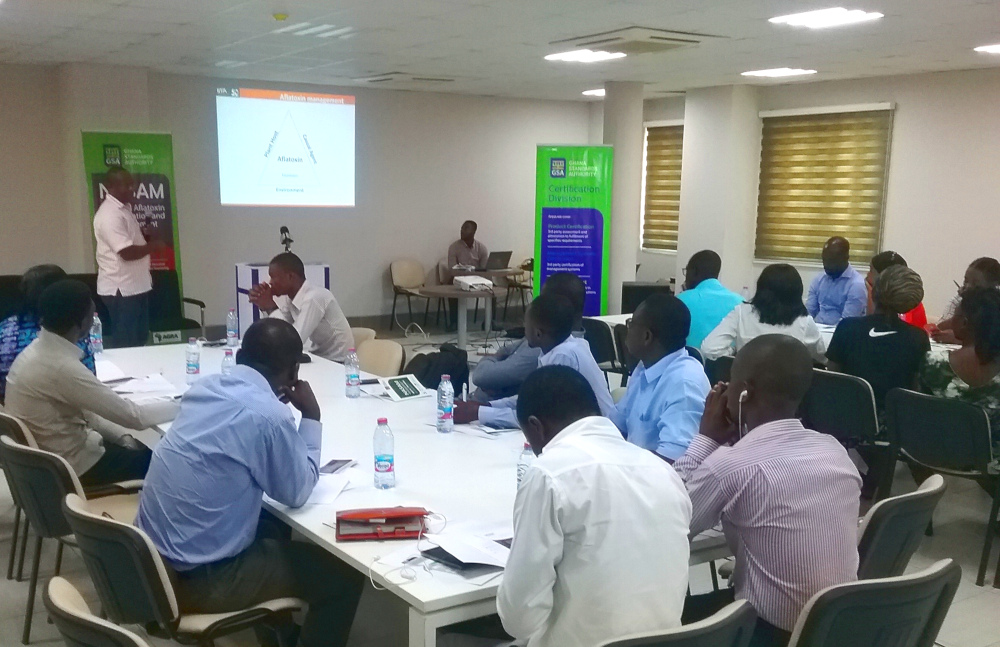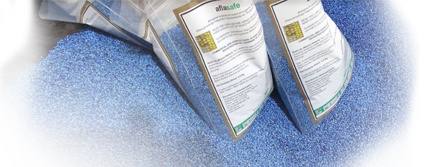In Ghana, as across the world, few people know about aflatoxin, though dangerous contamination is widespread in the country. Greater public awareness is essential if we are to successfully tackle the problem and create a sustainable future for solutions like Aflasafe. By working in partnership, we reach more people more effectively, and we give Ghanaians ownership of the life-saving knowledge we have to share. As we look forward to the official launches of the National Aflatoxin Sensitisation and Management (NASAM) project, we consider how we helped forge this powerful partnership and plan a national campaign that’s developing a life and a future of its own.
“Building partnerships is our most important strategy for making Aflasafe available to farmers. With AGRA and GSA, we co-created NASAM to bring different partners to the table and work out how we can collaborate for mutual benefit and maximum impact against aflatoxin. Together, we will achieve big results for Ghana.” —Ms Sally Adjetey, ATTC Business Development Specialist for Ghana

As we at ATTC work to transfer Aflasafe to local manufacturers and distributors, and create a sustainable future for the technology in the fight against aflatoxin, partnerships are at the core of all we do – and creating awareness of the dangers of aflatoxin is an essential task. In Ghana, we’re honoured to be partners in the National Aflatoxin Sensitisation and Management project. This major new initiative will increase and extend aflatoxin awareness across the country, covering the dangers and realities of aflatoxin, standards in Ghana, and how contamination can be managed and minimised. NASAM is led by the Ghana Standards Authority (GSA), funded by the Alliance for a Green Revolution in Africa (AGRA), and rooted in strong ongoing government support for action on aflatoxin.
For Aflasafe GH02 to reach beneficiaries on a large scale, public sensitisation is a must due to the sheer lack of awareness of aflatoxin in Ghana which is almost zero. Maize, groundnuts, and – to a lesser extent – sorghum are major staples, whose demand in Ghana always outstrips supply. This makes it very difficult for commercial partners to ‘sell’ the idea of Aflasafe or any other management solution, since end-markets will buy the product regardless of contamination. Consumer awareness of aflatoxin contamination and its dangers to health is needed to drive demand for safer foods. At the same time, farmers and other value-chain actors – like grain buyers, traders, and food processors and manufacturers – also need to know about aflatoxin contamination and how to tackle it, as do public institutions and organisations. Targeting these groups on a large scale is beyond the capability of any single party, but through NASAM partners have the opportunity to change the national landscape.
So how to build a partnership that fits and furthers the goals of all the collaborators, and maximises impact on the ground? Firstly, we needed to identify and reach out to likeminded organisations, with aims in common and complementary strengths to bring to the table. GSA was a natural match from early on, especially under the leadership of new Chief Executive Officer Prof Alex Dodoo (appointed in 2017). As the relevant government body, GSA has a clear mandate in setting aflatoxin standards, combined with a keen determination to get things done in improving aflatoxin management and cutting contamination in Ghana. It also has strong working relationships with other government bodies and organisations throughout the country, and is active on aflatoxin in areas such as improving testing infrastructure. Needing no convincing, GSA already clearly saw the need to raise aflatoxin awareness, and were well-placed to lead an initiative, but our nascent partnership lacked one crucial thing: funding.
At the same time, ATTC saw another important potential partner in AGRA, who already collaborate with several institutions in Ghana, were seeking ways to address food safety in their work, and were therefore interested in tackling the aflatoxin menace. For AGRA, the partnership offered an entry point to work with yet another public institution, in the form of GSA, that has the power to achieve large-scale change. AGRA were also very interested in the potential of Aflasafe as a new and effective tool against aflatoxin. Plus, they were willing and able to provide the funding needed to get a public-awareness campaign off the ground, as well as an advisory perspective – making them the third core member for a perfectly balanced team.
At ATTC, we see ourselves as one contributor in the fight against aflatoxin, working with our partners for maximum impact. To the NASAM partnership, we bring specialist knowledge and experience of aflatoxin management, and the Aflasafe solution. We were able to bring together the right partners, and support the development of the project. The process of planning and starting implementation has been all about collaboration with each partner bringing their complementary strengths to the table as needed.

The first wave of NASAM awareness-raising activities, and seed funding from AGRA, is intended to be catalytic. We hope to attract further funds to tackle aflatoxin, and to inspire other organisations, groups and government bodies and spur them to action in aflatoxin awareness and management. GSA is already engaging many partners and contacts from across its network to attend aflatoxin events and learn more about it, and we’re looking forward to seeing and supporting a flourishing anti-aflatoxin movement in Ghana in the future. In addition to IITA, a wide range of implementing partners have joined NASAM from the public, private and NGO sectors, brought together by the common ground of creating greater public awareness of aflatoxin (see full list of partners on the NASAM website).
Building general awareness of aflatoxin contamination for the public, farmers, and all those involved in the farming and food industries will lay the foundation for future sustained demand for solutions like Aflasafe – and with a government body like GSA to champion the cause, we will reach a far larger and wider audience than we could alone. While Aflasafe GH02 is one of the aflatoxin management strategies we promote – and a powerful tool that cut contamination by 96–100% in our tests in Ghana – NASAM encompasses all proven solutions to manage aflatoxin contamination along the value chain. Good agricultural and storage practices are in any case essential for Aflasafe to work most effectively, and we offer the project all-round expertise on aflatoxin management methods.
NASAM’s first event, a training day for media professionals, was held on 28th March 2019. As influential and trusted authorities who can easily reach thousands or millions of people, the media are crucial allies in spreading the word on aflatoxin. The training attracted more than 30 participants from across the Ghanaian media landscape – including print, radio and television – and covered the facts about and dangers of aflatoxin; aflatoxin standards in Ghana; the different ways that contamination can be managed; and the media’s role in communicating these food-safety risks to the public. It was an opportunity to ask lots of questions, examine misconceptions and discuss ideas. And the results are already showing, with increased, accurate and sustained media coverage on aflatoxin (see our press cuttings).
April 2019 saw a series of official NASAM launches across Ghana; we will be bringing you more on those in our next issue, and more updates as the project unfolds. ATTC has been part of most project events so far, and we have been impressed by GSA’s leadership and commitment to real and rapid change.
“NASAM is beginning to take on a life of its own,” says Ms Sally Adjetey, ATTC Business Development Specialist for Ghana. “As a public institution, GSA – and many of its partners – is a permanent body, unlike ATTC which has a fixed limited lifetime. This is therefore the perfect outcome for us, where we bring in our expertise and resources to achieve something much bigger. We’re helping to trigger an anti-aflatoxin movement that’s sustainable and that belongs to Ghanaians. Every partner in NASAM is being changed by the project. And together, we are shaping and charting an aflatoxin-safe future!”
LINKS
- NASAM website
- Previous news items from us:
- Dramatic demonstrations: aflatoxin testing and shared knowledge foster Aflasafe GH02 champions in Ghana
- Fighting aflatoxin with top-level leadership: new national steering committee for Ghana
- Aflatoxin awareness and forming Aflasafe leaders: ‘royal’ approval from market queens in Ghana
- Ghana’s grit, hard graft and great strides in aflatoxin awareness and Aflasafe GH02 partnerships
- Getting to grips with aflatoxin in Ghana – Aflasafe GH02 launched, bags gold
- Ghana’s growing and glowing gallery of collaborators to combat aflatoxin in food with Aflasafe GH02
- Aflasafe GH02 now registered in Ghana to protect maize and groundnuts from deadly aflatoxin
- Keep updated on the latest on Aflasafe in Ghana











I think if we care so much about posterity, then all hands must be on deck to drive the information in relation to aflatoxin contamination as well as the increasing need to use aflasafe technology solution to absolve us from aflatoxin contamination of groundnut and maize cultivation in Africa and the globe at large. Food security and safety is very crucial to achieve SDGs.
Hear, hear! We couldn’t agree more, Simon!